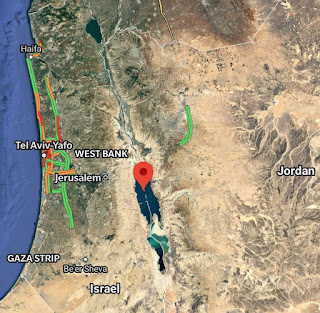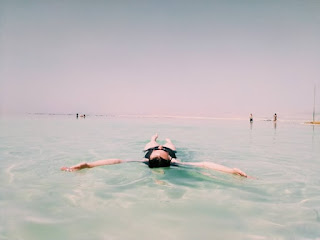WHY IS THE DEAD SEA SO SALTY?
When I was a child was fascinated after learning about the Dead Sea in my G.K book. I was thrilled to learn that we can never drown in the Dead Sea (Ironic!). My dad had told me why the Dead Sea is the way it is and I'm gonna tell you. Of course, I did a little research from my side too. Many of you might be knowing about this but its a light read, so, enjoy! Who knows, you might end up learning some facts you didn't know before!
As its name suggests, no organisms can survive in the dead sea and this is mainly accredited to its high-saline condition. Dead Sea's extra-salty water is also responsible for its buoyancy because of which humans can practically sit on its surface without drowning.
We all knew that already, there's no news there! But did you know the Dead Sea is not really a sea?
Lakes or ponds are fully surrounded by land and are often fed by streams or rivers. Whereas, Seas can be either surrounded by land (like a lake) or by the ocean (like a gulf). Bordered by Jordan to the east and by Israel to the west, the Dead Sea is a landlocked lake rather than a true sea.
How do water bodies get their salt?
Acids in rainwater slowly dissolve the rocks to create ions. The runoff carries the salt into the water bodies. The most common ions are Sodium and Chloride, that eventually form the salt.
Most oceans and seas have around 3.5 percent salt context but the Dead Sea is around 5 to 9 times saltier than normal seawater.
The high salt content is due to the fact that the Dead Sea has only one source of freshwater i.e., the Jordan River. Although there is an inlet source, being a landlocked lake, the Dead Sea does not have an outlet. Therefore, as the water reaches the sea, it has no way to exit. The Dead Sea geographically comes under the arid-low lying desert region where the rate of evaporation is way higher than that of open oceans. Over the years the water kept getting evaporated and a massive amount of salt was left behind.
It is disheartening to see that the Dead Sea is slowly disappearing due to human intervention. The Jordan River is being used for agriculture purposes which has paved way for a gradually reducing boundary of the Dead Sea and an increase in the salt content of the water.
A paper named 'Environmental impacts on the Dead Sea, sustainability cost estimates' by Majed Atwi Saab published in Environmental Economics in the year 2010 suggests that the water level of the dead sea drops by 1 meter every year.
FUN FACT: The shores and surface of the Dead Sea are about 1412ft below sea level. It is known to be the lowest elevation on land. A group of researchers who were part of a drilling project led by the Hebrew University and the Tel Aviv University found that around 120,000 years ago, before the last Ice-age, the Dead Sea had dried up completely.
CHECK OUT OTHER BLOGS FROM THIS AUTHOR. THANKYOU!!!
CHECK OUT BLOGS FROM URBANTRENSY








Aaiishh
ReplyDeleteOkay so there are 3 reasons why Dead Sea is important to the world..
ReplyDelete1) Although are no signs of aquatic signs but the sea definitely hosts some forms of microorganisms. These are called halophiles or extremophiles (salt-loving or living in extreme conditions). These microorganisms may have high potential uses but they haven't been tapped yet. If the sea is lost then we will loose the microorganisms the sea harbors and that is not a good thing.
2)the Dead Sea is unique. You won't such a marvelous wonder of nature anywhere else. So, for obvious reasons, such a creation must be protected at all cost.
3) Tourism. Dead Sea attracts several tourists so, loosing it will affect that too.